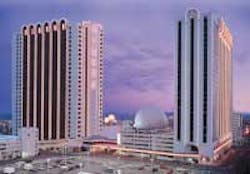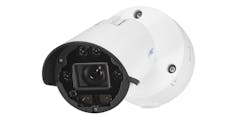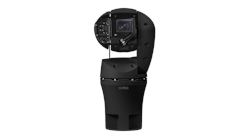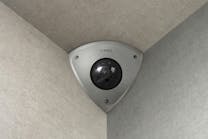Come Join the Circus: A Day In the Life of a Casino Locksmith
When you work for an MGM MIRAGE property, you are expected to not only be technically competent at your job, but also to be part of a large, diverse team. How large? Well, Circus Circus Reno Resort & Casino (CCR) has 1572 hotel rooms, six restaurants, and more than 1500 employees. CCR purchases 6000 packs of AA batteries, 5436 cases of frying chicken, 3756 cases of French fries, and 25,000 screws every year. The parent company, MGM Mirage, has 24 properties including The Mirage, Treasure Island, NY NY, and the Bellagio, to name a few. They have 70,000 employees and about 35,000 hotel rooms. In order to provide the best services to our guests, we must have the best team.
There are many benefits to working for such a large company. Our health care benefits include dental and vision coverage. Whenever possible, we are encouraged to take holidays off to be with our families. For me, this includes pretty much all holidays and all my vacation time. CCR wants it's employees to enjoy their time off so they can do their best when they are working. We also have a 401k plan, which the company actively promotes. Our main website is http://www.mgmmirage.com where more information can be found.
I would like to describe a typical workday at CCR, but I rarely have one. My normal hours are 7 a.m. to 3 p.m. Monday through Friday. I am not on call, but at one time or another I have been called in at every possible hour and day. I work in the Engineering Department. We are fortunate to have a large crew of trained professionals. We have plumbers, electricians, carpenters, welders, HVACR engineers, electronic technicians and other journeymen level mechanics that all work together. This can be extremely helpful. There is one full-time locksmith (that would be me) and several people who help out as needed. Our carpenters handle many duties that make my job easier such as cabinet lock preparation, hinge and pivot replacements, door closer replacements, etc. With hundreds of locked cabinets and over 6,000 doors, this is a huge help.
In the morning I park my car in the parking garage (which is a great benefit). Before I pick up a clean uniform (which CCR provides and cleans), I have to pass a Security Checkpoint. Casinos are very serious about security. We have a large, highly trained Security Department and a sophisticated CCTV system. Although we have a full time electronics technician who handles most of our CCTV system, I have been cross-trained in that area and I occasionally help out. I have installed wires, cameras, alarms, and I have done some of the programming of our CCTV Matrix. In fact, I do most of the computer back-ups of this system.
After changing in our locker room, I clock in. We currently use a bar coded employee badge for our time and attendance system. We have more than a dozen readers throughout the property, some of which I have helped install. These readers are on our in-house network. Their server is hooked up to our AS400 computers (450 miles away in Las Vegas) which gives them real-time updating. When an employee is hired or termed, updates can be accomplished very quickly.
At our pre-shift meeting our supervisor gives us a quick rundown on the day's events. We have a computerized work order system known as Maximo. Both one-time assignments and recurring preventative maintenance assignments are handed out. Preventative maintenance is an important part of our job. We do as much as we can, and then a little bit more. When a job is completed, it is logged. On a large property with so many employees speaking more than one language, it is helpful to be able to refer to a work order that lists a contact name and number in case more details are needed.
One of my typical requests would be to cut keys. These requests either come through Maximo or my email account. We have a strict key control policy. Some of the important points include:
- Department heads must approve all key requests for their area.
- If a department requests a key from another area, that department head must approve it.
- The general manager and the chief of security must approve keys to sensitive areas such as money counting rooms or gaming controlled areas.
- Outside vendors (contractors, etc.) will sign out/in keys daily from the Security Podium (which is staffed 24/7). They may not take keys home.
- Employees may present all parts of a damaged key for replacement. (This helps to prevent keys being thrown away)
- When keys cannot be accounted for, the department head of the affected area along with the Chief of Security will determine the course of action (issue replacement keys, rekey, etc.).
We have a large 7-pin SFIC system (Best) for the back of the house. When we rekeyed about five years ago, I was able to set up the entire system from scratch. After working with the previous system for over 10 years, I knew what I wanted to accomplish. I was able to drastically cut back on the number of keys that employees carried plus institute a paperless office. Previously, everyone had to sign for every key. With employees working 24/7, this was almost impossible to accomplish. Asking a graveyard employee to come in during the day to sign for keys is like asking a day shift employee to come in at midnight. Now, we enter them into the computer and give the keys to their supervisor.
We use Best's Keystone software. This correlates to their old index card system. Most of the bittings had to be put in by hand, so it was time-consuming to set up, but it has saved a lot of time and frustration since then. I can write notes such as the amount of locks, locations, and finishes on the door card. If there are any special keying needs, I can write down an explanation so that I can remember why I did something two years later. We also use it to track hotel room master keys, Marlok keys, etc. The great thing about SFIC is the amount of different locks that can be used. They even have a very high quality cam lock that fits into a standard cam lock prep and uses full size pins and keys. We currently have about 300 of these cam locks in use.
We are using more access control products all the time. Originally we used the old standby, Ilco Unican 1000s. Because they are limited to the amount of different codes they can use, we have been replacing them with Securitron SABLs. These locks have 10 numbers and many programming options. They are based on the Securitron DK26 platform. We also use the DK26s. Securitron's products have held up very well for us. They carry a lifetime replacement warranty and the factory is located less than 10 miles away. We have a few other brands also, such as Essex and Trilogy. Our Otis elevators have software built in that allows the normal floor buttons to be used as access control. I am responsible for changing the codes on these as well.
We use a variety of high security cam locks in our Gaming areas. The table games use Duo, Abloy, and Medeco locks. While we provide labor, we are not allowed to provide keys or locks. These are strictly controlled. Spare keys are kept in a Safe Deposit box at the main cage. It requires four people to replace a key: a cage supervisor, security supervisor, gaming supervisor, and accounting supervisor. Both the locks and keys are destroyed when they wear out. The slot machines use these same types of locks and are separately controlled by the Slot Department. We rarely work on these locks.
Our counting rooms have high security locks and a lot of video surveillance. The people who work there are checked out with metal detectors and have rules governing their movements when they are inside. For example, they have to show empty hands to the camera if they put their hands in their pockets. Many years ago when I dealt Craps and Roulette, we had the same rules. It gets to be a habit. More than once, I "cleared" my hands before reaching for my wallet at the store. Yes, that is a little embarrassing.
Now it is time for lunch. Each employee is allowed a free hot meal in our employee dining room. In fact, I have never seen a cash register in there. We use the same readers as our time and attendance system, which are wired to a heavy duty Perey turnstile to control access into the hot food area. These turnstiles are very well made. They have a huge solenoid that requires at least a 5-amp power supply. Magnetic locks are used on the Handicap Access gates, which are wired into one of these readers also. Designing and installing this system was both fun and challenging. Our EDR is known as the Basement Bistro. The employee who won the naming contest won $200. Unfortunately I had to share it with another employee who helped me come up with the name. (Thanks, Fred!)
After lunch I speak to my department head, Mike Miller. I tell him that the ALOA show is coming up and I need to take some classes to keep my CML current. The show is in Vegas where we have a lot of properties. As always he is happy to help out which makes me feel appreciated. It was a great show. I even ran into Jerry Levine.
At our main cage and the front desk, we have Safe Deposit boxes for our guests. Occasionally I have to open them in the event of lost keys. Every few years we go through them and open the boxes that guests abandon. The most valuable thing we ever found was $600. How do you completely forget $600?
Our hotel was one of the first in the state to get keycards. This was in 1989, 11 years before Y2K. Remember that? It won't be long before people who can remember that will be "old." We are using Saflok. This system has worked remarkably well. Considering we have almost 1600 rooms, we get very few calls. The locks have very good drill protection. When we have to drill one, we have to use special hardplate bits. Other bits won't touch them. I am responsible for the entire system. Wiring, hardware, software, updating users, preventative maintenance, issuing all master keys, etc. When a master key cannot be accounted for, we rekey immediately. I have been called back in the middle of the night more than once for this. We can have all the affected rooms rekeyed in a few hours. While not as fast as an on-line system, this is lightning fast compared to mechanical key systems. Probably the biggest advantage to these type of locks is that the locks automatically rekey themseleves at the guest level without affecting any of the master key levels.
We have a large Circus Midway where we have free Circus acts and many games where children of all ages can win prizes. Installing locks on the games and drop boxes is another of my duties.
When I first went to work at Circus Circus, I felt like I wasn't a real locksmith anymore. After working here over 18 years I can see that it was the right decision. Having so much support enables me to do a professional job and almost everything I work on is of commercial quality. Although I used to be able to open and make keys for any vehicle, I don't miss that as much as I thought I would. That field seems to have become very specialized, expensive, and maybe a little too competitive. I have learned a tremendous amount and the variety of things that I work on is amazing. I am now very comfortable with all kinds of electronic devices and have even picked up a few skills in other trades such as plumbing and HVACR. I even get to fill in for the Shift Supervisor on occasion. If you ever have the opportunity to get a job as an Institutional Locksmith, you should seriously consider it.






